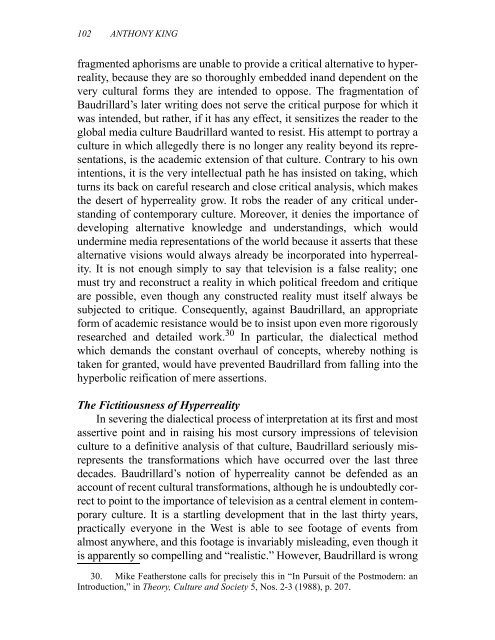King Baudrillard Telos.pdf - Exeter Research and Institutional ...
King Baudrillard Telos.pdf - Exeter Research and Institutional ...
King Baudrillard Telos.pdf - Exeter Research and Institutional ...
Create successful ePaper yourself
Turn your PDF publications into a flip-book with our unique Google optimized e-Paper software.
102 ANTHONY KING<br />
fragmented aphorisms are unable to provide a critical alternative to hyperreality,<br />
because they are so thoroughly embedded in<strong>and</strong> dependent on the<br />
very cultural forms they are intended to oppose. The fragmentation of<br />
<strong>Baudrillard</strong>’s later writing does not serve the critical purpose for which it<br />
was intended, but rather, if it has any effect, it sensitizes the reader to the<br />
global media culture <strong>Baudrillard</strong> wanted to resist. His attempt to portray a<br />
culture in which allegedly there is no longer any reality beyond its representations,<br />
is the academic extension of that culture. Contrary to his own<br />
intentions, it is the very intellectual path he has insisted on taking, which<br />
turns its back on careful research <strong>and</strong> close critical analysis, which makes<br />
the desert of hyperreality grow. It robs the reader of any critical underst<strong>and</strong>ing<br />
of contemporary culture. Moreover, it denies the importance of<br />
developing alternative knowledge <strong>and</strong> underst<strong>and</strong>ings, which would<br />
undermine media representations of the world because it asserts that these<br />
alternative visions would always already be incorporated into hyperreality.<br />
It is not enough simply to say that television is a false reality; one<br />
must try <strong>and</strong> reconstruct a reality in which political freedom <strong>and</strong> critique<br />
are possible, even though any constructed reality must itself always be<br />
subjected to critique. Consequently, against <strong>Baudrillard</strong>, an appropriate<br />
form of academic resistance would be to insist upon even more rigorously<br />
researched <strong>and</strong> detailed work. 30 In particular, the dialectical method<br />
which dem<strong>and</strong>s the constant overhaul of concepts, whereby nothing is<br />
taken for granted, would have prevented <strong>Baudrillard</strong> from falling into the<br />
hyperbolic reification of mere assertions.<br />
The Fictitiousness of Hyperreality<br />
In severing the dialectical process of interpretation at its first <strong>and</strong> most<br />
assertive point <strong>and</strong> in raising his most cursory impressions of television<br />
culture to a definitive analysis of that culture, <strong>Baudrillard</strong> seriously misrepresents<br />
the transformations which have occurred over the last three<br />
decades. <strong>Baudrillard</strong>’s notion of hyperreality cannot be defended as an<br />
account of recent cultural transformations, although he is undoubtedly correct<br />
to point to the importance of television as a central element in contemporary<br />
culture. It is a startling development that in the last thirty years,<br />
practically everyone in the West is able to see footage of events from<br />
almost anywhere, <strong>and</strong> this footage is invariably misleading, even though it<br />
is apparently so compelling <strong>and</strong> “realistic.” However, <strong>Baudrillard</strong> is wrong<br />
30. Mike Featherstone calls for precisely this in “In Pursuit of the Postmodern: an<br />
Introduction,” in Theory, Culture <strong>and</strong> Society 5, Nos. 2-3 (1988), p. 207.
















